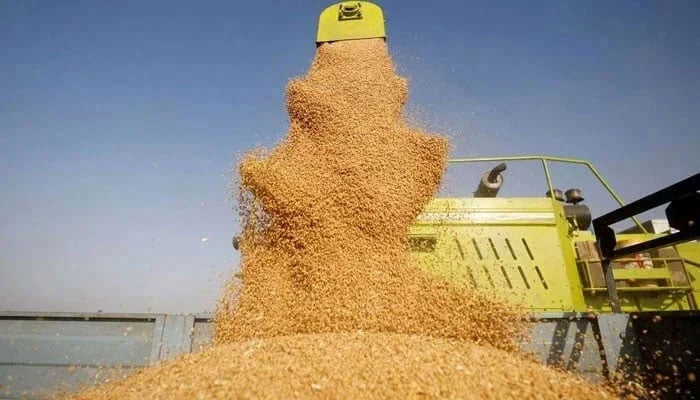Wheat production at risk amid declining prices
Senior official of the Ministry says that production of wheat is expected to decline in the next Rabi season
ISLAMABAD: Pakistan’s wheat production for the 2024-25 Rabi season may face a setback, as the government warns that a decline in wheat prices could discourage farmers from planting at their usual scale. The price drop may lead to a significant reduction in wheat output, exacerbating the country’s ongoing food security challenges.
A senior official of the Ministry National Food Security and Research informed the Senate standing committee on Tuesday that the initial forecast indicates that the production of wheat is expected to decline in the next Rabi season due to the lower price of wheat in the market. As a result, the yield of wheat is expected to be low in the next Rabi season.
The Senate Standing Committee on National Food Security and Research met here with Senator Syed Masroor Ahsan in the chair.
Wheat, which contributes nine percent to Pakistan’s agriculture sector and 2.2 percent to GDP, is a staple crop vital to millions of Pakistanis.
With wheat production facing mounting challenges, the Pakistan Agricultural Storage and Services Corporation (Passco) also faces financial strain. The corporation, which plays a key role in maintaining wheat reserves to stabilise prices, relies heavily on loans from commercial banks—covering 75 percent of its finances. Passco has also accumulated receivables totaling Rs194.746 million from provincial food departments and other government bodies.
Meanwhile, the textile sector, which drives Pakistan’s exports, owes nearly Rs3 billion in cotton cess arrears to the Pakistan Central Cotton Committee (PCCC). Rather than clearing their dues, many textile firms have opted for litigation, with 121 industries filing 65 cases disputing the cess. Of these, 63 cases have been decided in favor of the PCCC, with two cases still pending in the Peshawar High Court.
The collection of cotton cess also remains fragmented, as the official informed that of the 341 textile companies involved, 184 are paying, while 157 are non-responsive. This trend is a sign of Pakistan’s larger problem with enforcing regulations.
In the 2023-24 fiscal year, the PCCC managed to collect just Rs293 million in cess, raising questions about the committee’s governance.
Amid these agricultural concerns, the Senate committee decided to form a sub-committee to investigate the wheat import scandal, which has raised significant public and parliamentary concern. Senator Aimal Wali Khan will lead the investigation into the inefficiencies and regulatory lapses that continue to undermine Pakistan’s agricultural stability. The panel was also informed about the role and composition of the Wheat Board, which includes 27 members, such as representatives from the federal and provincial governments, agriculture and food departments, growers, and industry stakeholders.
-
 Gracie Abrams Follows 'Kylie Jenner Playbook' With Paul Mescal Romance
Gracie Abrams Follows 'Kylie Jenner Playbook' With Paul Mescal Romance -
 Dua Lipa Shares 'Love Letter' With New Boyfriend After Emily Ratajkowski Confirms Romance With Her Previous Beau
Dua Lipa Shares 'Love Letter' With New Boyfriend After Emily Ratajkowski Confirms Romance With Her Previous Beau -
 Brazilian Beauty Influencer Passes Away After Suffering 'medical Emergency'
Brazilian Beauty Influencer Passes Away After Suffering 'medical Emergency' -
 Sarah Ferguson Turns Into A Bulldozer With Beatrice, Eugenie: ‘Help Me Out’
Sarah Ferguson Turns Into A Bulldozer With Beatrice, Eugenie: ‘Help Me Out’ -
 Australian Prime Minister's Letter Against Andrew Mountbatten-Windsor Made Public
Australian Prime Minister's Letter Against Andrew Mountbatten-Windsor Made Public -
 'Project Runway' Alum Tim Gunn Reveals Why He's Been Celibate For 43 Years
'Project Runway' Alum Tim Gunn Reveals Why He's Been Celibate For 43 Years -
 Delroy Lindo Breaks Silence On John Davidson's Racial Slur Shock At 2026 BAFTA: 'We Did What We Had To Do'
Delroy Lindo Breaks Silence On John Davidson's Racial Slur Shock At 2026 BAFTA: 'We Did What We Had To Do' -
 King Charles Prepares Next Move As Andrew Shows No Remorse
King Charles Prepares Next Move As Andrew Shows No Remorse -
 Epstein's Brother Invited To Discuss Royal Family's Future After Andrew's Arrest, On Popular Show
Epstein's Brother Invited To Discuss Royal Family's Future After Andrew's Arrest, On Popular Show -
 BAFTA Winner Robert Aramayo Defends Director's Racial Slurs Amid Tics
BAFTA Winner Robert Aramayo Defends Director's Racial Slurs Amid Tics -
 Prince William, Kate Middleton’s Troubles Take On A New Face: ‘They’re Steeling Themselves’
Prince William, Kate Middleton’s Troubles Take On A New Face: ‘They’re Steeling Themselves’ -
 'Coronation Street' Star Sally Ann Matthews Finally Reveals Why She Quit ITV Soap
'Coronation Street' Star Sally Ann Matthews Finally Reveals Why She Quit ITV Soap -
 Prince Andrew's Major Sacrifice For Princess Beatrice, Eugenie Royal Titles Revealed
Prince Andrew's Major Sacrifice For Princess Beatrice, Eugenie Royal Titles Revealed -
 ICE Agent Misfired Bullet Into Minnesota Hotel’s Guest Room
ICE Agent Misfired Bullet Into Minnesota Hotel’s Guest Room -
 Andrew Mountbatten-Windsor, Fergie Still Counting On Each Other? Deets
Andrew Mountbatten-Windsor, Fergie Still Counting On Each Other? Deets -
 Piers Morgan Reacts To Photo With Ghislaine Maxwell
Piers Morgan Reacts To Photo With Ghislaine Maxwell




